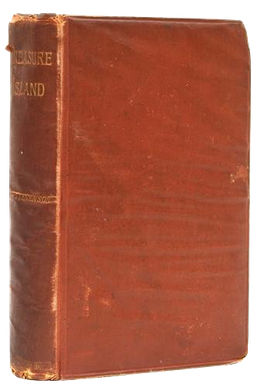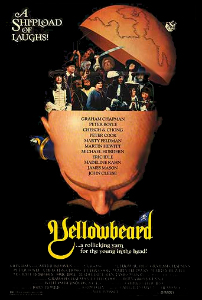Blind spot or Blindspot may refer to:

Treasure Island is an adventure and historical novel by the Scottish author Robert Louis Stevenson. It was published in 1883, and tells a story of "buccaneers and buried gold" set in the 1700s. It is considered a coming-of-age story and is noted for its atmosphere, characters, and action.

Pepé Le Pew is an animated character from the Warner Bros. Looney Tunes and Merrie Melodies series of cartoons, introduced in 1945. Depicted as a French anthropomorphic striped skunk, Pepé is constantly on the quest for love and pursuit of romance but typically his skunk odor causes other characters to run away from him.

Captain J. Flint is a fictional golden age pirate captain who features in a number of novels, television series, and films. The original character was created by the Scottish writer Robert Louis Stevenson (1850–1894). Flint first appears in the classic adventure yarn Treasure Island, which was first serialised in a children's magazine in 1881, and later published as a novel in 1883.

Yellowbeard is a 1983 comedy film directed by Mel Damski and written by Graham Chapman, Peter Cook, Bernard McKenna, and David Sherlock, with an ensemble cast featuring Chapman, Cook, Peter Boyle, Cheech & Chong, Martin Hewitt, Michael Hordern, Eric Idle, Madeline Kahn, James Mason, and John Cleese, and the final cinematic appearances of Marty Feldman, Spike Milligan, and Peter Bull.
Robert Matthews may refer to:

The Legends of Treasure Island is a British animated television series. It had two series of 13 episodes each and each episode runs for 22–25 minutes.

Penelope Pussycat is an animated cartoon character, featured in the Warner Bros. classic Looney Tunes animated shorts along with Pepé Le Pew. Although she is typically a non-speaker, her "meows" and "purrs" were most often provided by Mel Blanc using a feminine voice. The character did not originally have a permanent name; she was alternately referred to as "Penelope", "Fifi", "Pussycat Purr", and "Fabrette", and animator Chuck Jones' 1960 model sheet simply calls her "Le Cat". The name Penelope Pussycat was created retroactively for Warner Bros. marketing.

Billy Bones is a fictional character appearing in the first section of Robert Louis Stevenson's 1883 novel Treasure Island.
Stinky generally refers to having a strong odor.

Treasure Island is a Soviet Ukraine two-part live-action/animated adventure comedy television film adaptation of Robert Louis Stevenson's novel Treasure Island (1883). It was created by the studio Kievnauchfilm in between 1986 and 1988. It is mostly traditional animation with some live action sequences, which are largely but not entirely separate.
In the United States, between 4% and 15% of citizens demonstrated nonreligious attitudes and naturalistic worldviews, namely atheists or agnostics. The number of self-identified atheists and agnostics was around 4% each, while many persons formally affiliated with a religion are likewise non-believing.

Treasure Island is a 1920 silent film adaptation of the 1883 novel by Robert Louis Stevenson, directed by Maurice Tourneur, and released by Paramount Pictures. Lon Chaney played two different pirate roles in this production, "Blind Pew" and "Merry", and stills exist showing him in both makeups. Charles Ogle, who had played Frankenstein's Monster in the first filmed version of Frankenstein a decade earlier at Edison Studios, portrayed Long John Silver. Wallace Beery was supposed to play Israel Hands, but that role went to Joseph Singleton instead. The film was chosen as one of the Top Forty Pictures of the Year by the National Board of Review.
A pew is a long bench seat used for seating members of a congregation or choir in a church.

Felix Arvid Ulf Kjellberg, better known as PewDiePie, is a Swedish YouTuber known for his comedic videos. Kjellberg's popularity on YouTube and extensive media coverage has made him one of the most noted online personalities and content creators. He has been portrayed in media as a figurehead for YouTube, especially in the genre of gaming.

Marzia Kjellberg is a former Italian Internet personality. Known for her videos on her now-inactive YouTube channel Marzia, Kjellberg has also ventured into writing, fashion design, and business. She is married to Swedish YouTuber Felix ”PewDiePie” Kjellberg.
Blinding Light is a 2005 novel by Paul Theroux.
Cocomelon is a children's YouTube channel operated by Candle Media-owned Moonbug Entertainment. The channel specializes in 3D animation videos of traditional nursery rhymes and original children's songs. As of May 2024, Cocomelon is the 3rd most-subscribed and 2nd most-viewed channel on YouTube.

PewDiePie vs. T-Series, also known as Great Subscriber War, was an online rivalry between two YouTube channels, PewDiePie and T-Series, for the title of the most-subscribed YouTube channel. T-Series held the title of most-subscribed YouTube channel until June 2024, and PewDiePie had been the most-subscribed YouTube channel from August 2013 to April 2019. The rivalry between the two YouTube channels began when T-Series' subscriber count began to near PewDiePie's in late 2018.










